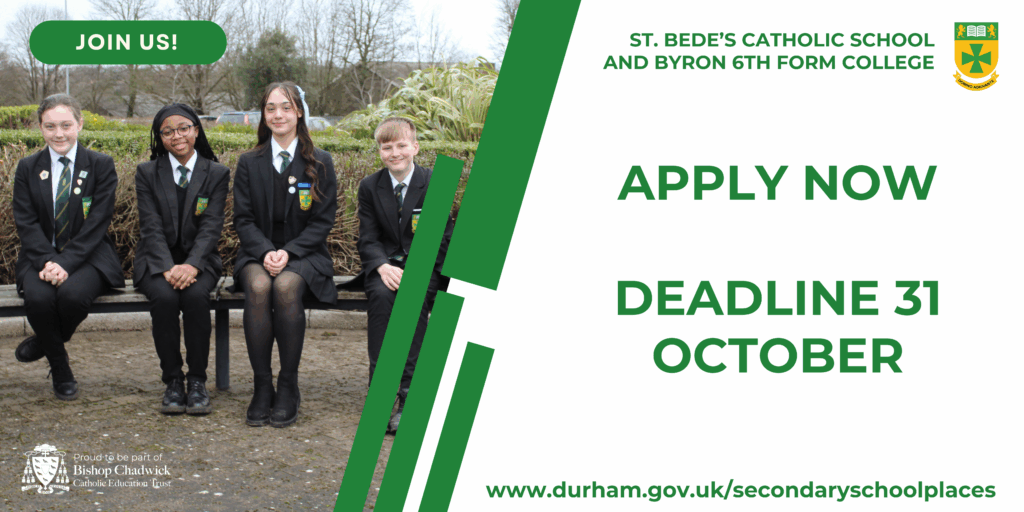In this section of the website, you will find information about the Intent, Implementation and Impact to teaching Physical Education (PE) at St Bede’s Catholic School. View our course information below:
The curriculum is sequenced coherently, allowing the interweaving of topics to support the acquisition of key concepts; it is compatible with the key requirements of the National Curriculum and robust collaboration between primary and secondary phases ensures progression. Curriculum components are repeated over time, ensuring all pupils practise retrieval, master skills and concepts, develop long term memory and make progress from starting points. Retrieval tasks are built into all lessons to enable pupils to remember more. The ‘Bigger Picture’ is shared with pupils, providing them with a rationale for their learning and to make links between lessons, allowing them to know more and remember more. Teachers ensure lessons provide a supportive environment for all pupils including those with SEND, removing barriers to learning and participation through adaptive planning, modelling, scaffolding, explicit instruction and metacognitive strategies. Accurate, regular assessment enables an informed and systematic judgement to be made about a pupil’s knowledge, understanding, skills and attitude. Pupils are provided with feedback and set ‘perfecting our work’ targets to close any learning gaps. Teachers provide a language-rich environment. Key tier 2 and tier 3 vocabulary is mapped out carefully across the curriculum to enable our pupils to learn the correct words and phrases in the right order. A phonics-led approach is used to improve reading and spelling. Carefully selected texts are used to foster a culture of scholarly reading. Pupils are given opportunities to consider how their learning links to future study and careers, and the importance of British Values. The curriculum is enriched to include experiences outside the classroom, such as lunch-time clubs all throughout the year. The clubs match the activities being taught in the current cycle in order to extend the learning and level of the pupil. Several club activities lead to performance and teams which in turn, offer intra and inter-school competition. The different areas of the curriculum are covered as are team and individual sports. Homework tasks allow pupils to watch live events on person or on television. Pupils can use social media to access information about the activity. This offers extension PE has its own subject specific numeracy and language for health, fitness and sports specific words, numbers and data. Pupils need to record, track and analyse and interpret when required. At St Bede’s our intention is for our students to Key concepts and activities are revisited each year, allowing students to develop their skills to become more controlled, fluent and precise as they progress through Key Stage 3. Applying skills and strategies In Year 7 students work in teaching groups to build on the fundamental skills of agility, balance and co-ordination they have developed in key stage 2 and apply these to new sports in competitive situations. To begin with, the focus is on students developing competence and control in a range of different activities, and they learn basic rules and patterns of play. Most activities are new to the students and so require simple skill development. In Year 8 these activities and skills are revisited, with students being challenged to be more precise in their use. They learn to apply them using efficient movement so strategies to win become more effective. In Year 9 students are expected to become more fluent and develop higher levels of linking and using skills in their performances, using t better movement and tactics to overcome the opposition. Observation, analysis and leadership In Year 7, students are given opportunities to develop basic skills of leadership of others within a group setting, such as leading a warm up. In Year 8, students are encouraged to take greater leadership responsibility; they are challenged to develop an understanding of the activity so they can make greater improvements to their own work and that of others. In Year 9 students begin to lead themselves in lessons through a variety of different situations, with some even acting as ‘teachers’ themselves. Health & fitness In Year 7 students are challenged to consider the fitness components of all the activities they take part in, and develop an understanding of the impact on heart rate and wider health benefits. These concepts are reinforced in Year 8 and students take their learning further by studying effects of specific training techniques. In Year 9 students study and take part in fitness testing and training methods specific to performance development. Lifelong activity Our aim is to provide our students with a lasting interest in engaging in physical activity. In Year 7 students are provided with a range of enjoyable opportunities to experience the feeling of success, encouraging further participation. In Year 8 physical activity is further encouraged through competitive opportunities in and out of school and students develop more sporting ability thus greater confidence in themselves. In Year 9 students continue to develop their performance in a range of activities, providing them with the skills to confidently continue outside of school as well as in. Learning Journey
Key Stage 4 Assessment objectives
BTEC Level 2 Award
Progression Maps



